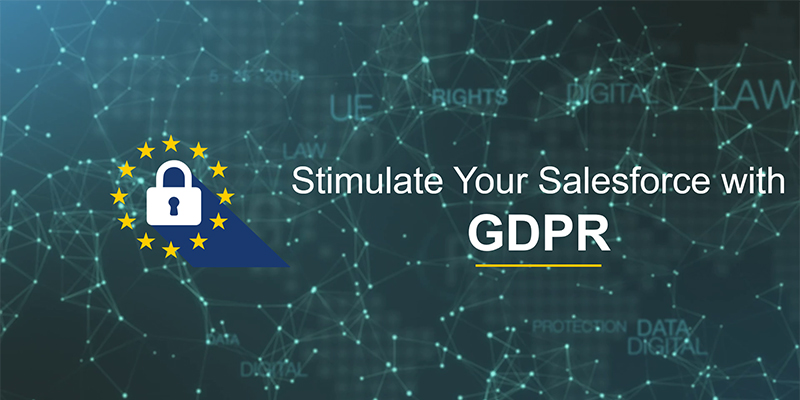When customers walk while saying “I would love to do business with them” is the eventual key to success. Salesforce is one of the technologies that is winning the hearts of customers.
Am I right? Probably, because Salesforce is the #1 CRM in the world.I hope the readers have liked part 1 of data security blog which was dedicated to Salesforce Shield http://www.vinaychaturvedi.com/blog/salesforce-shield-protecting-customers-data/. As promised, I am back with part 2 bringing you with some more interesting facts about Data Privacy.
General Data Protection Regulation ushers an innovative era in Data Privacy. If you are using cloud apps like Salesforce, Google G Suite then under GDPR Act, you should do a few things about Data Privacy. Are you aiming to gather and protect your personal data from cloud apps? Then, GDPR is here to assist you. Isn’t it amazing? Readers are you ready to delve into what’s in store within GDPR or more importantly GDPR readiness within Salesforce.
May be closely monitoring your customer data starting with the cookies is where you can initiate your Salesforce GDPR compliance strategy for e-commerce. Most noteworthy, EU’s GDPR regulation strictly applies to all the companies doing business in European Union or with the European citizens online in order to protect the privacy and personal information of the citizens. As a result, the customers of Salesforce Commerce Cloud catering to European customers must align with the GDPR compliance strategies.
Besides e-commerce, the customers of Salesforce Marketing Cloud also need to be aligned with EU’s GDPR. Above all, as the technology is booming, marketing tech is becoming more complicated. Therefore, Salesforce GDPR compliance within Marketing Cloud will become more complex i.e. the ways in which they make use of customer data. Seems like, marketers need to evaluate and reconsider all the marketing strategies which is being targeted to European customers. European customers need to re-strategize their policies no matter what Salesforce product they are using.
How Salesforce is adopting Data Privacy
Salesforce Data Protection & Privacy page lists out the guidelines on data deletion, processing personal data and tracking customer consent that are relevant to many privacy regulations like HIPAA (Health Insurance and Portability Act).
Data Deletion
First of all, delete personal data in order to comply with data protection and privacy regulations.
Consent Management: Track Customer Consent
Also, tracking customer’s approval on how company interacts with them.
Restriction of Processing: Restrict How to process Personal Data
Furthermore, this prevents processing of customer’s data when require to do so.
Data Access & Portability: Give Customer their Data when they want it
Finally, this exports the customer-related data when requested by the customers in compliance with data protection and privacy regulations.
| Data Deletion | Consent Management: Track Customer Consent | Restriction of Processing: Restrict How to process Personal Data | Data Access & Portability: Give Customer their Data when they want it |
| Data Deletion for Sales Cloud
|
Consent Management for Sales Cloud
|
Restrict Data Processing for Sales Cloud | Data Access & Portability for Sales Cloud |
| Data Deletion for Service Cloud
|
Consent Management for Service Cloud
|
Restrict Data Processing for Service Cloud
|
Data Access & Portability for Service Cloud
|
| Data Deletion for Communities
|
Consent Management for Communities | Restrict Data Processing for Communities | Data Access & Portability for Communities |
| Data Deletion for Salesforce Platform
|
Consent Management for Salesforce Platform
|
Restrict Data Processing for Salesforce Platform
|
Data Access & Portability for Salesforce Platform
|
| Data Deletion for Marketing Cloud
|
Consent Management for Marketing Cloud | Restrict Data Processing for Marketing Cloud | Data Access & Portability for Marketing Cloud |
| Data Deletion for Financial Services Cloud | Consent Management for Financial Services Cloud
|
Restrict Data Processing for Financial Services Cloud
|
Data Access & Portability for Financial Services Cloud
|
| Data Deletion for Health Cloud
|
Consent Management for Health Cloud | Restrict Data Processing for Health Cloud | Data Access & Portability for Health Cloud |
| Data Deletion for Pardot
|
Consent Management for Pardot | Restrict Data Processing for Pardot | Data Access & Portability for Pardot |
| Data Deletion for Analytics
|
Consent Management for Analytics | Restrict Data Processing for Analytics | Data Access & Portability for Analytics |
| Data Deletion for Quip
|
Consent Management for Quip | Restrict Data Processing for Quip | Data Access & Portability for Quip |
| Data Deletion for Heroku
|
Consent Management for Heroku | Restrict Data Processing for Heroku | Data Access & Portability for Heroku |
GDPR for Salesforce Admins and Developers
Probably, Salesforce with it’s every release enhances the platform with some of the amazing new features. Above all, Salesforce came up with the concept of individual object with Spring’18 release. So, a Salesforce admin needs to enable it from data protection & privacy configuration page. Most importantly, once this feature is enabled then both admins and developers can begin using individual object.
Individual object is use to track person’s data collection preferences i.e. whether they want to be processed or not and so on. An individual record is not associated with one lead, contact or person account record. Besides, if a lead and contact record both are for the similar person then person’s preferences can be tracked with a single individual record value linking both lead and contact record.
GDPR seems like daunting only if personal information is being stored on more than one database. In contrast, with Salesforce as a consolidated CRM having fewer databases will limit GDPR issues. Probably, managing large volumes of data can be troublesome. Therefore, strategies need to be planned out. Consequently, GDPR can completely revolutionize and transform the organizations by improving data privacy and security. As a result, the features discussed in this blog are just a few of the benefits of GDPR within Salesforce. Let’s keep finding out more and more.





